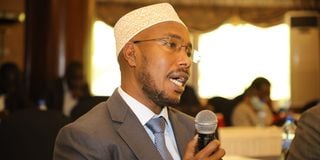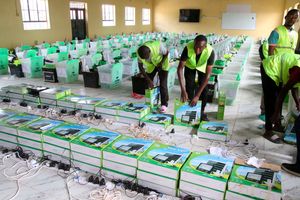Premium
IEBC seeks Sh4.7bn to upgrade technology ahead of polls

Acting IEBC CEO Marjan Hussein Marjan. The electoral agency is seeking an additional Sh4.7 billion to meet the shortfall needed to conduct the August 9 General Election.
The electoral agency is seeking an additional Sh4.7 billion to meet the shortfall needed to conduct the August 9 General Election.
At the same time, MPs have expressed concerns over the high number of senior officers at the commission who are holding their positions in an acting capacity, warning this could compromise the credibility of the poll.
The Independent Electoral & Boundaries Commission (IEBC) chief executive Marjan Hussein Marjan pleaded with the MPs to consider their request to enable them to prepare well.
He told the Committee on Justice and Legal Affairs that the funds would largely be used to upgrade the Kenya Integrated Election Management Systems (Kiems).
Deploy Kiems kit
This means that the commission will deploy the Kiems kit in the elections despite the disappointing failures of the technology in 2017.
The funds will also cater for election materials, Covid-19 compliance on the polling day, voter education and information and communication.
The figure is over and above the Sh8.8 billion that the National Treasury has proposed to allocate the agency in the first supplementary budget that was tabled in the House last week.
“Adequate and timely funding is critical in the management of the election,” Mr Marjan said when he appeared before the committee to discuss the 2022 Budget Policy Statement (BPS) on Friday last week.
The commission had requested Sh40.085 billion this financial year for preparations but the National Treasury allocated Sh33.01 billion.
The allocation was spread over two financial years. The commission received Sh14.5 billion in 2021/22 and the balance of Sh18.8 billion staggered into the 2022/23 financial year.
On Friday, Mr Marjan said the Sh4.7 billion should be front loaded from the 2022/23 allocation under the strategic intervention and brought forward to cater for some of the commission’s expenses this financial year.
Election materials
Out of this, Sh1.77 billion will cater for the budget for election materials, another Sh588 million will take care of the Covid-19 compliance during voting, voter education will gobble up Sh197 million, while ICT systems will take Sh2.18 billion.
The budget for ICT systems will include an audit of the election technology, expansion of wide areas network to 30 county offices and developing a collaboration framework with mobile network service providers for results transmission system.
The funds will also be used to upgrade the Biometric Voter Registration (BVR) database and hardware infrastructure to accommodate more than 20 million voters.
The commission acquired the Kiems kit at Sh6.8 billion from the French firm Idemia in 2016. However, many of them malfunctioned on the polling day and failed to identify voters or transmit election data as planned.
Supreme Court nullification
One of the grounds that the Supreme Court relied on to nullify the outcome of the August 8, 2017 presidential vote was because the results were not transmitted through the Kiems as had been planned.
The commission is divided into nine directorates. However, four of them are headed by individuals in an acting capacity.
Mr Marjan and his deputy, Mr Obadiah Keitany, are all in acting capacity, raising questions about the commission’s level of preparedness.
Mr Chrispine Owiye is acting in charge of the directorate of Legal and Public Affairs, Ms Joyce Ekuam in the directorate voter education, partnerships and communications and Ms Catherime Kamindo in charge of the directorate of Research, Boundaries and Development.
“There are too many acting officers at IEBC. What is not happening?” posed Ruaraka MP Tom Kajwang.
“The absence of substantive holders of the offices raises the question of accountability on the part of the commission. No one will take responsibility in the event things don’t go as they should,” he added.





